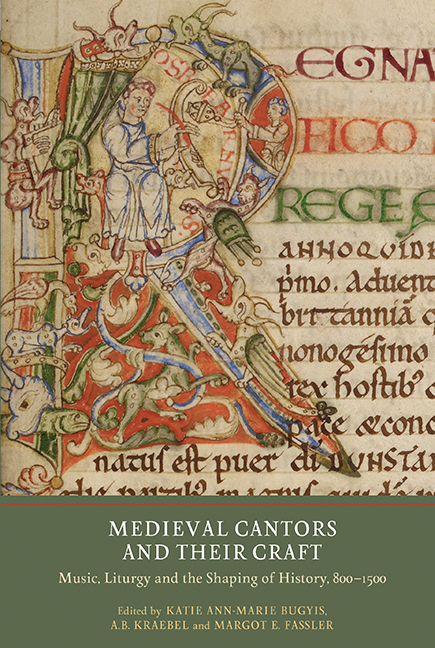Book contents
- Frontmatter
- Dedication
- Contents
- List of Illustrations
- Contributors
- Acknowledgments
- Abbreviations
- Miscellaneous Frontmatter
- Introduction
- PART I The Carolingian Period
- PART II The Eleventh Century
- PART III England in the Twelfth Century
- PART IV On the Continent: Five Case Studies
- 15 The Cantors of the Holy Sepulchre and their Contribution to Crusade History and Frankish Identity
- 16 Shaping Liturgy, Shaping History: A Cantor-Historian from Twelfth-Century Peterhausen
- 17 The Roman Liturgical Tradition According to a Twelfth-Century Roman Cantor
- 18 A Life in Hours: Goswin of Bossut's Office for Arnulf of Villers
- 19 Writing History to Make History: Johannes Meyer's Chronicles of Reform
- Index of Manuscripts
- General Index
- Miscellaneous Endmatter
18 - A Life in Hours: Goswin of Bossut's Office for Arnulf of Villers
from PART IV - On the Continent: Five Case Studies
Published online by Cambridge University Press: 25 October 2017
- Frontmatter
- Dedication
- Contents
- List of Illustrations
- Contributors
- Acknowledgments
- Abbreviations
- Miscellaneous Frontmatter
- Introduction
- PART I The Carolingian Period
- PART II The Eleventh Century
- PART III England in the Twelfth Century
- PART IV On the Continent: Five Case Studies
- 15 The Cantors of the Holy Sepulchre and their Contribution to Crusade History and Frankish Identity
- 16 Shaping Liturgy, Shaping History: A Cantor-Historian from Twelfth-Century Peterhausen
- 17 The Roman Liturgical Tradition According to a Twelfth-Century Roman Cantor
- 18 A Life in Hours: Goswin of Bossut's Office for Arnulf of Villers
- 19 Writing History to Make History: Johannes Meyer's Chronicles of Reform
- Index of Manuscripts
- General Index
- Miscellaneous Endmatter
Summary
Sometime in the 1230s, Goswin of Bossut, cantor of the Cistercian monastery of Villers-la-Ville, wrote a vita for a lay brother of his abbey, Arnulf. Goswin was an accomplished biographer, and the three surviving hagiographies attributed to him reveal an author as attentive to lyrical prose and scriptural allusions as to lively anecdotes displaying the virtues of his subject. His stint as a hagiographer seems to have been undertaken at the behest of his abbot, William, who presided over the apex of a period of growth of Villers and was likely invested in promoting the monastery's status through the vite of several holy persons associated with it – in this instance, a conversus who had come to Villers some thirty years earlier and earned renown for the extremes of his penitential conduct as well as his generosity toward others. Goswin likely met Arnulf only toward the end of the lay brother's life, but his description is nevertheless vivid; over the course of two books, Goswin first lays out Arnulf's extraordinary exercises of self-mortification and then (as if to temper the somewhat grotesque image of Arnulf's physical sufferings) uses the second book to describe his charity, obedience and humility.
Goswin's commemorative work did not end with the vita; a liturgical office for Arnulf also survives, presumably as part of the same hagiographical programme. In it, Goswin was able to use his skills as cantor to shape the memory of Arnulf in a different way. In writing an office for Arnulf, Goswin had a second mode for retelling the past, one with its own formal constraints as well as opportunities to emphasize and authorize new aspects of its subject. Careful study of this office reveals, first, the methods by which a cantor such as Goswin worked to transform a prose historical work into a liturgical one and, secondly, the different images of Arnulf promoted through Goswin's two historical undertakings. Medieval history writing, particularly hagiography and chronicles, has been the subject of much recent scholarly study, yet it is uncommon to be able to see the process of liturgical-historical composition as clearly as Goswin's work allows. The office for Arnulf has the unusual virtue of being associated with a reasonably well-defined time and place, as well as with a vita by the same author.
- Type
- Chapter
- Information
- Medieval Cantors and their CraftMusic, Liturgy and the Shaping of History, 800-1500, pp. 326 - 339Publisher: Boydell & BrewerPrint publication year: 2017



